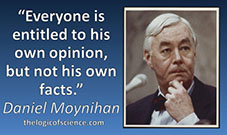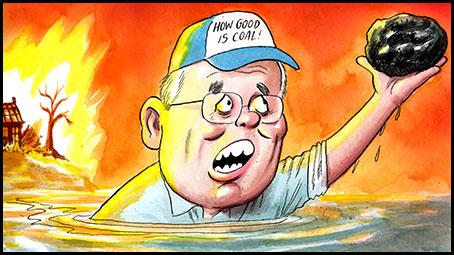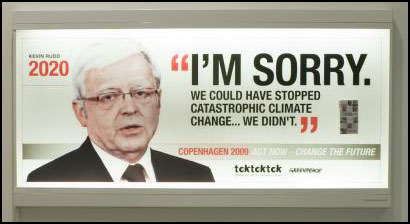The Psychology of Climate Change Denialism
So, why do I write incessantly about
CC and CC-Denialism?
That's why:

This is an article that sheds light on the psychological processes underlying CLIMATE CHANGE DENIALISM (essay in my book en.light.en.ment) ...
As an aside, I just came across this book:
1038 Don't even think about it
Climate Change?
Don't even think about it
... by Clive Hamilton ... Wikipedia. Clive Hamilton is professor of public ethics at Charles Sturt University in Canberra. This a reducted excerpt of the SMH article:
How to lose friends and influence the security of your nation
It’s uncomfortable when a belief you have long held is contradicted by new facts. Even more so if an entire worldview comes under pressure from the evidence.
Psychologists call it "cognitive dissonance" and it explains why it is so hard to change our minds even though we flatter ourselves that we base our opinions on the evidence.
A most powerful source of discomfort is the fear that if we change our views and express a new opinion then we will be cast out of the community of those who share and reinforce our beliefs.
Most people most of the time find ways to explain away or ignore evidence that contradicts their beliefs. We talk to those who agree with us, limit ourselves to media that confirms our biases, and attack those presenting contradictory evidence as somehow disreputable or purveyors of fake news.
Clive Hamilton is a man who successfully discarded and replaced many of the assumptions and biases he had developed since his teenage years. Like everyone, through his life he clung to beliefs well after they had been disproven by any cool assessment of the facts.
For over 20 years most of his work, including five books, was focused on climate change. When in the mid-1990s he first began reading what the climate scientists were saying he could see the enormity of the implications.
For many years only a handful of people were ready to face up to the facts ... even the major environment groups, much to his frustration, took years before they worked climate change into their established patterns of thinking.
Many people on the conservative side have found the evidence from scientists too threatening for their worldviews to accommodate. The more environmentalists began to raise the alarm, the more resistant they became, because accepting the facts would mean conceding political ground to their enemy ... they adopted various ways of downplaying, reframing or just denying the evidence.
So, I am appealing to the many conservatives ... to reassess their beliefs about climate change. I can’t promise it will be easy to undo deeply held opinions and rearrange your worldview; it means conflict with your political confreres.
You may lose friends.
______________________
Read the whole article at the SMH ... a very sobering insight into the psychology of Climate Change Denialism. Over the years I wrote many blogs on the subject of climate change, one of my favourite ones is about an article by Ian Dunlop ...
... now, who is this guy? A looney Greenie? Not really, Ian Dunlop was formerly an international oil, gas and coal industry executive (987); the third blog is about the science of climate change ... the real science (watch the BBC video, 972); the fourth & fifth are fact-laden articles in the NYT, (997) by Richard Flanagan and (1007) about Australia showing us the Road to Hell. Finally, the sixth blog (992) is another reality check ... how on Earth can 11,000 scientists be wrong? Yep, apparently they're all wrong!
However, first of all go to my blog 999 ... but be careful, it may scare you.
999 The Age of Consequences
Climate change as you've never thought about it
987 Something wicked: Climate Change Denial
Something wicked is going on in Australia:
the Climate Change Denialists lobby
will lead us into catastrophe
972 The "real science" of Climate Change
Once again I got sucked in; oh, woe is me
______________________
So, how do Australians feel about the bush fire crisis, the climate change emergency and our Prime Minister? They are exasperated and they tell Scott Morrison to fuck off ...
1008 Our PM met by the people's wrath
Our Prime Minister has been subjected to a truth:
Australians are fed up with the government's climate change denial
______________________
And last but not least, the idiocy of climate change denialism in Australia:
1001 Charlie Pickering, Climate Change and Alan Jones
What can a grain of rice tell us about climate change?
As it turns out lots.
And why exactly do we have CC denialism?
Is somebody somewhere sometimes not telling something?
______________________
The Logic of Science ... is a blog about, well, the logic of science and especially climate change denial fallacies:

"The climate is changing, and we are the primary cause. These are simple facts that are supported by a vast body of evidence and agreed upon by virtually all experts. Nevertheless, many people continue to think that the "science is not settled” and there is "no scientific consensus" among experts. Unfortunately, these myths have been propagated and supported by very active misinformation campaigns ..."
“Settled” science
What is meant by “settled science”? There are many people who argue adamantly that science is never “settled” because it is always possible that some future discovery will overturn the current thinking. That is technically true, but it can be misleading and requires clarification.
It is true that science, by its very nature, does not provide “proof.” Rather, science shows us what is most likely true given the current evidence. So to that extent, it is true that science is never 100% “settled,” because it is always technically possible there is something we have missed. However, there is a huge difference between a technical possibility and practical doubt.
So, does that mean that the science isn’t “settled” or that there is serious debate on the topic? Of course not ... and we must act as if it is correct until such time as compelling evidence arises to the contrary. This is true for a very large number of scientific topics. There are many things that have been so thoroughly studied that they are as close to “settled” as science can possibly come, and it does not make sense to talk about them as if there is any practical doubt.
What is a scientific consensus?
There are two different levels at which we can talk about a consensus. At one level, there is a consensus of experts. In other words, this exists when the vast majority of experts agree on something. This is what most people think of when they think of a scientific consensus, but it is not actually the best level to look at.
When we say something like, “this is a fact” or “the science is settled,” we aren’t basing that on a consensus of experts, but rather a consensus of evidence (i.e., a large body of studies that all agree with and support each other). The consensus of experts is a secondary by-product of the consistent body of evidence. This is really the level we need to look at when asking questions like, “is there any serious debate on topic X.” Science is not a democracy. It is about evidence, not authority.
So simply finding some people with advanced degrees who disagree with X does not mean that there is serious scientific debate about the topic. Rather, if there is serious debate, it will be reflected in the peer-reviewed literature, because people will be publishing papers presenting evidence that X is not correct. So that is really the level we should focus on when we talk about a scientific consensus: the evidence, not the experts.
There is an overwhelming consensus that we are causing climate change. This consensus exists both among studies and among scientists. Indeed, recent estimates put it at over 99.9% agreement that we are causing the climate to change. Thousands of studies have confirmed that we are the cause, and virtually none argue that we aren’t.
Further, the handful of contrarian studies are riddled with problems and are easily debunked. Every shred of evidence confirms that we are causing climate change, and there is no serious debate among experts.
This level of consensus is important, because it means that there is no valid reason for doubting the reality that we are causing climate change.
Nevertheless, it is possible to cherry-pick studies and experts that disagree with the consensus, but doing so is folly! As I explained, it is always best to look at the evidence itself, but for most people, that’s not possible, in which case it is rational to simply listen to experts, but why would you choose to listen to the 0.01% of experts who disagree with the consensus?
You wouldn’t do that on a topic like smoking causing cancer, so why would you do that with climate change? If 9,999 doctors diagnosed you with cancer and told you to immediately start treatment, but 1 doctor told you that you had nothing to worry about, would you blindly follow that one doctor? I highly doubt it, so why would you do that with climate change? Why would you listen to the 1 scientist saying we aren’t causing it rather than the 9,999 who are saying that we are causing it and need to change our actions?"
______________________
A letter to the newspaper, re: SMH ...
Morrison suddenly risks frittering away his 'miracle' election win
Dear Editor,
Tony Walker points to Scott Morrison’s principal vulnerability (apart from a sagging economy and health) as the sharp increase in our concern about the environment. Bush fires, drought - 60 percent of us believe Australia should be doing more on climate.
But wait, our PM will not be doing any such thing, because ‘this government will do what it promised the people of Australia at the election’, and that was the absolute minimum on climate change amelioration, because ‘we only cause 1.5 percent of global emissions’.
Has there ever been a more idiotic stance by any politician? ‘We will not change our minds, no matter what’! God help us.
-------------------------
Carsten Burmeister
______________________

Read more on Australia, fires, climate change denialism
and our Prime Minister, from the Sydney Morning Herald:
The world watches as Australia burns
The world has made a link between Australian coal, fires and climate;
by Nick O'Malley, SMH
Fires rage while Sydney parties on
“2020 arrives in sparkling Sydney style,” crowed the City of Sydney’s New Year’s Day media release; by Elizabeth Farrelly, SMH
______________________

I devised a conservatives’ script re. Climate Change Denialism:
Climate Change is not an issue!
There is no climate change.
If there is climate change, it’s natural, has been happening over and over for millions of year.
If extraordinary climate change is occurring, it is not man-made:
·there is no empirical evidence for that
·if evidence is presented it is not agreed upon by scientists
or it is falsified
·the issue of so-called climate change is a political one
·if nations have populated low lying islands or territories that apparently are now being inundated, that is their problem
·to spend billions to help them out is socialism in disguise
If climate change is man-made, there is very little that can be done about it.
If an attempt is made to ameliorate apparent climate change, it will be too costly … it would cost hundreds of billions of dollars.
If it is decided to spend that money, then not from my tax dollars.
Climate change is not a problem for my generation; if the younger generation decide to spend all that money on such dubious science … then they can be the ones paying for it.
So-called climate change is not an issue for me.
And that is of course largely because The Australian, the newspaper climate change deniers read, hardly reports on CC (when it does, it describes climate change as a "cult" and "a socialist plot"); check this out:
1003 News at NEWS Corp
It came as a bombshell surprise to News Corp